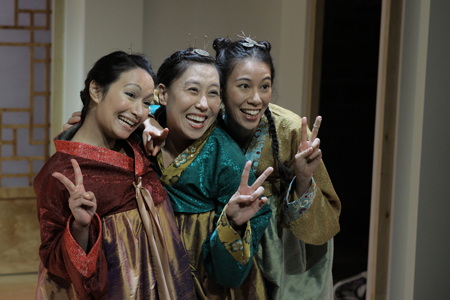
(l to r): Patricia Penn, Sue Jin Song and Youngsun Cho in Songs of the Dragons Flying to Heaven by Young Jean Lee at The Studio 2ndStage. Directed by Natsu Onoda Power. Photo credit: Carol Pratt
“My work is about struggling to achieve something in the face of failure and incompetence and not-knowing. The discomfort and awkwardness involved in watching this struggle reflects the truth of my experience.”
— Young Jean Lee, playwright
It would be easy to write about Songs of the Dragons Flying to Heaven as a play about racist stereotypes, the culpability of bigotry that we all share regardless of personal race. Certainly there is a great deal of that theme on display at The Studio 2ndStage’s production, playing now through October 24. But essentially, to me this is a play about failure – the failure to understand one another, to communicate, to believe, to love oneself. It’s a powerful piece with a core of deep self-hatred and the awful humor that comes from knowing one’s weakness, and giving in to it.
Raw emotion like that is not easy to watch, so the pre-set tricks the audience into false sense of tranquility. Shepherded behind the seats through an incense-filled temple walkway, glowing with candles and red paper lanterns, you might think you’re in for a lovely spa evening.
Then three women in beautiful traditional Korean costumes reveal a video of playwright Young Jean Lee, her tear-streaked face puffy from repeated hard slaps, her eyes wounded and staring at you, her audience – her tormenters and conspirators.
You probably wouldn’t expect to laugh after that opening. But you do.
Experimental theater can be risky. The Studio 2ndStage’s mandate is to present “edgy, extreme and electrifying productions.” It’s a tall order that truly suceeds here. Audience members alternately laughed and squirmed as the action unfolded. Jiehae Park’s opening monologue of rage as Korean American sets her character up as a figure of power, only to be dragged down and beaten both horrifically (and hysterically) by the three traditionally garbed women. Korean 1, 2 and 3 are to be reckoned with – played with the malicious giggling certainty of a schoolgirl clique by Patricia Penn, Sue Jin Song, and Youngsun Cho.
The power struggle between these four women continually weaves through the play, as the playwright’s words toy with the audience’s perceptions of the minority/majority power struggle, at times confirming and then subverting them. As Korean American says, “People think of me as this empowered Asian female, but really I’m just a fucking white guy.”
With a few notable exceptions, most of the audience the night I attended seemed afraid to laugh unless given permission to do so. The alienation was the most extreme in a long sequence detailing all the various methods of suicide as graphic video projections ooze gore over the dying women. It’s alternately disgusting, gorgeous, and hysterical. That’s all part of the show, however. When Rachel Holt and Brandon McCoy as White Person 1 and 2 begin to bicker incessantly, perfectly illustrating the stereotypes of Angry Bitch and Weak Beta, the majority-white crowd relaxed a bit – you could almost hear people thinking, “it’s ok to laugh at them.” But their narcissistic addiction-fueled battle royale is just as painful to watch.
Director Natsu Onoda Power has done an excellent job of keeping the non-linear action moving in a tight dance with no intermission, only slowing down for a scene between Korean American and her grandmother on her deathbed. And rightly so, for this is the heart of it, as the playwright reveals her fears and vulnerability to us verbally just as she did visually at the start (only to subvert everything later on in a hilariously vicious “Come to Jesus” parody). The actors are all equally game, whether it’s the manic trio’s rapid-fire switching between evil sweetness and light-hearted violence, or the absolute fearlessness with which Park, Holt and McCoy reveal their characters’ self-hatred. Everyone is so present and vulnerable to the audience it feels like voyeurism; we’re Peeping Toms caught in the act.
Be prepared to have your prejudices rattled – not just the racial stereotypes, but your assumption of the role as an audience member as well. You will be addressed, you may be pulled on stage, you may sing along or be uncomfortably silent. This is experimental theater at its best – verbally confrontational and visually provocative. Your reaction may be conflicted. It should be.
The Studio Theatre is located at 1501 14th Street NW. Closest Metro Stop: Dupont Circle (Red line), McPherson Square (Orange/Blue line). For more information call 202-232-7267.


Pingback: Tweets that mention We Love Arts: Songs of the Dragons Flying to Heaven » We Love DC -- Topsy.com
I saw this show last night and think your review does a great job capturing the discomforting and thought provoking nature of this show.
Thanks Lisa!
I could visualize the show fully in your review. Very nice.